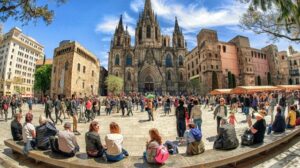The Sagrada Familia, the Guel park, the Las Ramblas boulevard… but also the crowds, the noise, and the rising property prices: faced with an increasingly massive influx of visitors, Barcelona is seeking to overhaul its tourism model, a source of tension among the Spanish city’s residents.
With 170,000 visitors a day on average, according to authorities, tourism accounts for 13.5% of the GDP of the capital of Catalonia province, in the northeastern part of Spain. But it is also the third most important issue facing its 1.6 million inhabitants, according to the latest figures from local authorities. “In Barcelona (…) there is too much economic dependence on the tourism sector,” assessed Daniel Pardo, a member of the Association of Districts for Tourism Decalcification, according to whom tourism after the COVID-19 pandemic experienced “too fast and aggressive” growth.
Evidence of the discontent among Barcelona residents is graffiti with the slogan “Tourists go home” and protests against over-tourism which have increased in recent months. The city is facing record numbers of tourists, as is the whole of Spain, which last year became the world’s second most popular tourist destination after France, with 85.1 million international visitors.
On Sunday, several thousand people protested the staging of the America’s Cup – a sailing race that has been held in the city since August — and the city’s economic model.
Over the summer, photos of some protesters aiming water guns at tourists had drawn strong condemnation from authorities, who are concerned that tourist phobia could take a violent turn.
“Violence is when you are evicted from your neighborhood” or when you are forced to watch your surroundings “disappear little by little,” Pardo assessed.
Opposed to the forcible conversion of their homes into tourist accommodation, the tenants of a 120-home building near Barcelona Central Station have gone to court to stop the owners. Around 30 homes have already been affected by the change and the future of the rest is uncertain.
“We have had cases of tourists vomiting from one balcony to another, problems with noise because they are holding parties, the smell of marijuana,” explained Pamela Batigabe who fears she will be forced to leave Barcelona, where rents have risen 68% in 10 years. “We are not against tourism. We are against this form of uncontrolled tourism, it is not sustainable,” she added.
In an attempt to calm tempers, Barcelona’s mayor, Socialist Jaume Colboni, announced in June his intention to ban short-term rentals of tourist accommodation by the end of 2028. The measure could affect 10,000 homes. However, the property owners’ association Apartur called Colboni’s announcement “veiled blackmail” and pledged to take legal action. It is seeking one billion euros in compensation if the measure is implemented.
In the face of this threat, the municipal authorities have responded that they stand by their position. “We need to find different strategies” to deal with over-tourism, insisted Jordi Valls, deputy mayor, who deemed it necessary “to develop other activities” to diversify Barcelona’s economy.
But these efforts are seen by many as insufficient, especially as municipal authorities have come out in favor of the controversial Barcelona airport expansion project. At the moment, “we are not dealing with over-tourism in terms of de-escalating or stopping tourism”, but by trying “to spread it out in time and territory”, assessed Anna Torres Delgado, a professor at the Geography Department of Barcelona University.
But “we should start to design tourism development strategies taking into account not only economic indicators but also social and environmental ones,” she added.
.
Ask me anything
Explore related questions





